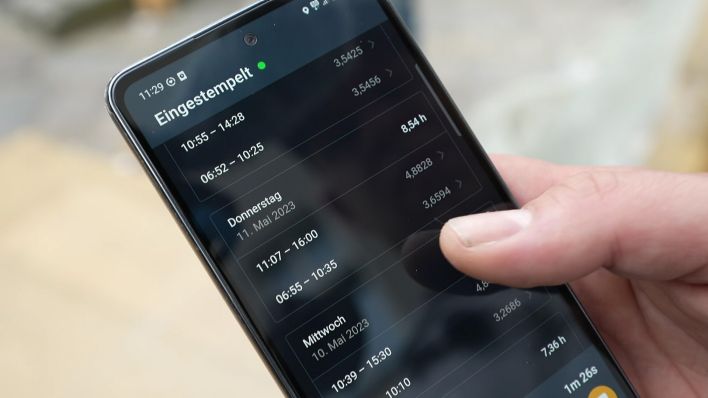Comeback of the time clock
–
Electronic timekeeping will soon apply to (almost) everyone
Last September, the Federal Labor Court ruled that in future not only overtime but all working hours must be recorded. Politics and business are now asking themselves how this can be implemented. By Martin Kueper
First of all, it is only a draft bill, which the Federal Ministry of Labor presented in April [tagesschau.de]to implement a judgment of the Federal Labor Court. But this is unmistakable: “The employer is obliged to electronically record the beginning, end and duration of the employee’s daily working hours on the day of work,” it says.
A list at the end of the month, for example, is no longer possible, and responsibility is also clearly defined: the employer has an obligation. It is also clear that every company must now find an electronic solution to implement this requirement. Since it is only a draft law, there is a parallel political discussion about how sensible and practicable this is – and the economy is also looking for a way to make the labor court judgment implementable.
A time tracking app
For example, for many construction companies, it is standard practice to record the hours worked by their bricklayers, painters and drywallers, since they are paid according to the hours worked. An affordable electronic solution could now be an app developed by the German Deep Tech Institute in Potsdam.
The Berlin building contractor Eckhard Schulte has been testing them on his construction sites for a year. His employees press a start or stop button and also log out and back in during a break. Schulte says that nobody feels monitored as a result: “Of course that was an issue at the beginning. But the app only transmits the GPS signal at the moment when the person logs in and logs out again. Otherwise, no movement profiles are created or anything else. ” In addition, the GPS only works on the assigned construction sites.
More accurate than paper
For bricklayer Kevin Jänicke, the working day usually begins at seven o’clock. For example, if he comes at 6:52 a.m. and logs in, he will also be paid for this time. His boss Eckhard Schulte argues that this is fairer than the standard working hours listed in the past, and Jänicke is also satisfied: “It makes my work easier: one push of a button and our office has it on the computer and sees it. “
There is another argument that his boss puts forward: Berlin is the capital of the colleagues he describes as “part-time bricklayers” who state that they do not work full-time. With an app, one can now see better how much time they actually spend on the construction sites and are employed subject to social security contributions – and not just continue to work illegally.
It will probably take a while
The discussion about recording began with a ruling by the European Court of Justice (ECJ) in May 2019, which obliged employers in the EU to record time. The Federal Labor Court has now passed the first draft law, which, however, grants small companies in particular years of transition periods even after it has been passed.
Before the law is passed, there is debate. Not only do numerous business associations have concerns about the expected costs and the bureaucratic effort, there is also resistance in politics.
Many companies are still at a loss
Eckhard Schulte is one of the few entrepreneurs to comment on the subject of timekeeping – most companies that are asked about this prefer to keep a low profile. This is also due to the fact that any decisions must always be coordinated with the works councils.
Many electronic time recording instruments also have a data protection side that needs to be checked carefully. Because the border between recording and monitoring is narrow, but must not be crossed. The present draft also allows for the possibility of doing without electronic recording if both sides, i.e. management and works councils, can agree on this. For smaller companies that employ no more than ten people, there should be no obligation to record electronically.
Exceptions for Executives
It also seems certain that executives do not have to document their working hours. Since the regulation of the recording of working hours will become part of the Working Hours Act, they are an exception already defined there. This law already does not apply to managers, chief physicians and heads of public services, for example. Home care and the liturgical area of churches and other religious communities are already exempt.
Broadcast: rbb24 evening show, May 20th, 2023, 7:30 p.m

